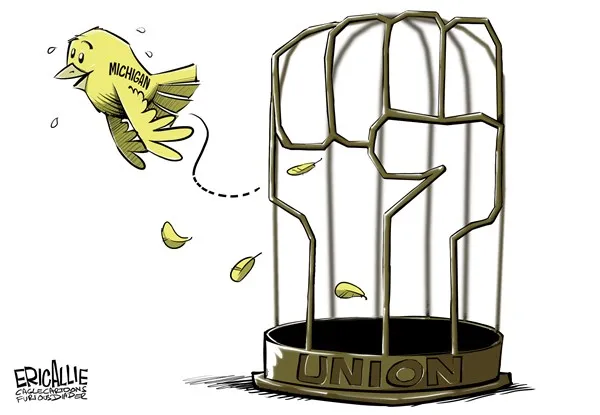Record Indicates Right to Work Law Would Economically Benefit Missouri Employees, Businesses

House Makes History Regarding Right To Work Legislation

Will Missouri legislators emulate their forward-thinking Indiana and Michigan counterparts by passing legislation to protect employees from being fired for refusal to pay dues or fees to an unwanted union? Image: Eric Allie/Cagle Cartoons
As the account linked above shows, legislators in the Missouri Capitol in Jefferson City are now passionately debating whether Show Me State employees and employers would benefit from enactment of a Right to Work law.
For the first time in decades, Right to Work is on the table in Missouri. Grass-roots activists, many of them members of the National Right to Work Committee, deserve most of the credit. Additional credit goes to Indiana and Michigan, which respectively became the 23rd and 24th Right to Work states just last year, increasing the total number of such states in the Midwest from five to seven.
The primary reason for enacting a Right to Work is to furnish genuine legal protection for the individual employee’s right not to join an unwanted union without being fired as a consequence. Currently in Missouri, this right is protected only nominally. An employee can refuse to join the union that wields monopoly-bargaining power at his or her workplace, but may nevertheless be forced to pay the union so-called “agency” fees. Union bosses can even demand that nonmembers fork over forced fees for union political and ideological activities. Only if the nonmember expressly objects is the union required to limit the amount of forced fees it collects at all.
Right to Work would empower employees who don’t want a union to cut off all financial support. That’s only fair. Just as an employer shouldn’t be able to fire employees for paying dues to a union, an employer (acting at Big Labor’s behest) shouldn’t be able to fire employees for refusing to pay union dues or fees.
Big Labor insists that, however reasonable and fair they may be, Right to Work laws should be opposed because they are economically harmful. But the record indicates this is far from true.
Take, for example, Missouri, its two forced-unionism neighbor states (Illinois and Kentucky) and its six Right to Work neighbor states (Arkansas, Iowa, Kansas, Nebraska, Oklahoma and Tennessee).
From 2002 to 2012, private-sector payroll employment rose by an aggregate 3.0% in Missouri’s Right to Work neighbors, but fell by 1.5% in Missouri, Illinois and Kentucky combined and by 1.6% in Missouri alone. Over the same period, real private-sector compensation (including wages, salaries, benefits and bonuses) rose by 11.2% in Missouri’s Right to Work neighbor states. That’s more than nine times the increase in Missouri alone and nearly five times the aggregate increase in Missouri and its two forced-unionism neighbor states.
Adjusted for interstate differences in cost of living according to indices calculated and published by the Jefferson City-based Missouri Economic Research and Information Center, 2012 per capita disposable income was also slightly higher in Missouri’s Right to Work neighbors than in Missouri alone or in Missouri and its non-Right to Work neighbors combined.
In short, there is no plausible reason whatsoever to anticipate Missouri employees would be harmed economically if their Right to Work regardless of union affiliation or nonaffiliation were protected. On the contrary, the objective record indicates employees would benefit economically in addition to having far greater personal freedom.

